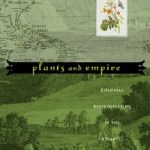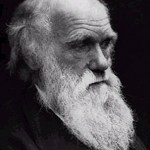History
As Jawaharlal Nehru wrote of his native land but as a stranger in the process of discovery, "India is a geographical and economic entity, a cultural unity amidst diversity, a bundle of contradictions held together by invisible threads." These invisible threads were the spiritual beliefs of the people, the Vedas, the Bhagavad Gita and the Manu Smriti. The sacred Ganges was a symbol of India's life blood, as much for the Indian people as for the British colonialists, that, as Rudyard Kipling described in his story "The Bridge Builders," was a natural force that needed to be conquered if the…
This post appeared here originally on 31 October 2007
Have you ever wondered, perhaps on 31 October, why witches are depicted as riding brooms?
The answer is alluded to by Karmen Franklin at Chaotic Utopia in her post as to why witches need to know their plant biology.
The excerpts I'm about to give you come from a superb and accessible pharmacology text entitled, "Murder, Magic, and Medicine," by John Mann, host of the BBC Radio 4 series by the same name.
Witches
"Double, double toil and trouble
Fire burn and cauldron bubble" - Macbeth IV, i
Hallucinogenic compounds called tropane alkaloids…
Ron Numbers gave a brief history of creationism, reminding us that perhaps a majority of the people in the world reject Darwin, and he also emphasized a few facts in that history that many would find surprising.
There was no organized opposition to evolution until the 1920s, when it was marshalled by William Jennings Bryan, who was most concerned about the ethical implications of evolution. He made the point that the popular movie about the Scopes trial, Inherit the Wind, was historically inaccurate. One of the most memorable moments in the movie was when Darrow pinned Bryan down on the date…
I'm not a close follower of the news, but the past week I've checked The New York Times for David Rohde's chronicle of his period of captivity and escape from the Taliban. All five articles are up now (and an epilogue).
The always-outstanding neuroblogger, SciCurious, put up an excellent post overnight on a presentation she saw at the current Annual Meeting of the Society for Neuroscience (SfN) in Chicago. Therein, she wrote about a poster presentation she saw on the relationship between iron, cholesterol, and Alzheimer's disease.
All was quite well until near the end of her post. That is where my writer's block of the last week dissipated and manifest itself as a blogpost-length comment.
This is a lovely post otherwise but you've obviously been drinking if you think you could get away with "an enzyme…
Feel like watching a little TV tonight? PBS is showing a new Nova tonight, Darwin's Darkest Hour, which looks to be about his worries about publishing his theory.
Aldous Huxley wrote in his Collected Essays that, "Most ignorance is vincible ignorance. We don't know because we don't want to know." In Plants and Empire: Colonial Bioprospecting in the Atlantic World, Stanford historian Londa Schiebinger highlights the role that such intentional ignorance played in the dissemination of knowledge (and the lack thereof). Whether this ignorance is of local plants and languages--because of the early scientific tradition of naming species only after revered European naturalists--or whether it is of the abortifacients that women would use to terminate an…
Anne Frank: the only existing film images (0:09-0:14):
July 22 1941. The girl next door is getting married. Anne Frank is leaning out of the window of her house in Amsterdam to get a good look at the bride and groom. It is the only time Anne Frank has ever been captured on film. At the time of her wedding, the bride lived on the second floor at Merwedeplein 39. The Frank family lived at number 37, also on the second floor. The Anne Frank House can offer you this film footage thanks to the cooperation of the couple.
More at Mashable.
Sculpture fragment from the Cathedral of St. Lambert in Liège.
Today's bus excursion took us up the river Maas/Meuse into Wallonia, Belgium's Francophone part, where our first stop was Liège. The city looks pretty crummy, I'm afraid, with a lot of dilapidated and dirty buildings. The ironworks (?) outside town are grotesque in their gargantuan size and run-down brutal ugliness. It's like a nightmare about the Ruhr. A must-see for industrial romantics.
In central Liège is a great big square that used to be the site of the Cathedral of St. Lambert. It got torn down 200 years ago, apparently…
Musical styles can have really weird names. There's sauce music (salsa), meringue music (merengue), juvenile delinquent music (punk), record collection music (disco), LSD warehouse music (acid house), popular music (pop), you name it. But some of the most intensely loved musical styles have names that mean "copulation music".
"Jazz" was once a verb meaning "to fuck". Jazz music was originally played in the better class of New Orleans brothel, where men would listen to music before, well, getting down to some actual jazzing and jizzing.
Likewise with "swing". A verb meaning "to fuck". (Here…
Most Americans are familiar with Darwin's theory of evolution by natural selection, but less well known is his personal struggle with the conflicting ideologies of science and religion. A new film from producer Jeremy Thomas, Creation, aims to tell the story of Darwin's life through the cinematic lens—but Americans who would pay the box office price to watch it unfold won't be able to. US distributors have opted not to pick up the film, which the Telegraph reports has gotten outstanding early reviews, due to concerns that its message won't sit well with religious groups. Ethan Siegel of…
At my other weblog, two reviews of books on Eurasia. First, Empires of the Silk Road: A History of Central Eurasia from the Bronze Age to the Present. Second, China's Cosmopolitan Empire: The Tang Dynasty.
I just read Eugenie Scott's review of the movie, Creation, a drama about the life of Charles Darwin that was recently screened at the Toronto Film Festival. This film, which -- astonishingly -- does not have a distributor in the USA, humanizes Darwin by showing us key events from his life after he returned from his famous five-year voyage aboard the HMS Beagle. But Eugenie Scott is not the only one who likes this film; it has received positive reviews from Rotten Tomatoes, Ray Bennett of THReviews, the IMDB and Roger Ebert. Besides being touted as an excellent film, Creation has the coolest…
Perhaps you don't know this, but Philadephia has a very large collection of Darwin literature — it only makes sense, since in the early years of our country that city was the center of science and philosophy in the US. The American Philosophical Society Museum is having a major exhibit of those artifacts, so you should get down to Fifth Street and amble through. If you can't make it (regretfully, I'm stuck in Morris for a while), they have an online tour.
There's a new movie coming out about Darwin that does something different: instead of talking about the science of evolution, it's about Darwin's personal life. Roger Ebert has seen it and offers a few thoughts on the subject matter (it isn't a review, though!), and it sounds interesting — I'll be seeing it if it appears in Morris, which isn't likely, or when it's available on DVD, which is much more likely. I'm not worried that it will provide comfort to creationists, but I am a little concerned that it may Hollywoodize history a little bit.
Ebert points out that it focuses on the…
Once again we come to another September 11. It's hard to believe that it's been eight years since that horrible day. On this day, traditionally, I do two things. First, I post the following video.
This video was shot by Bob and Bri, who in 2001 lived in a high rise a mere 500 yards from the North Tower. On this eighth anniversary of the September 11 attacks, I think it's important to post this again. It is the most prolonged and continuous video of the attack that I have seen, and, as such, It is difficult to watch.
That's why it's so important to watch.
Second, I either repost or post a…
...Hitler is most displeased with President Obama and what he did earlier this week:
The government of the UK has officially apologized for its past abuse of Alan Turing. Here is the full statement.
2009 has been a year of deep reflection - a chance for Britain, as a nation, to commemorate the profound debts we owe to those who came before. A unique combination of anniversaries and events have stirred in us that sense of pride and gratitude which characterise the British experience. Earlier this year I stood with Presidents Sarkozy and Obama to honour the service and the sacrifice of the heroes who stormed the beaches of Normandy 65 years ago. And just last week, we marked…
Just yesterday I posted on preserving the the history of the computing field, musing at the end that digitization projects could save a lot of documents.
Well, what comes along today in the latest What's New @ IEEE for Students is a note about the IEEE-USA History Project:
Digital Archives, Organization's Four Decades of Service Unveiled
IEEE-USA is building a digital archive featuring documents and photos of its 36-year history of promoting the careers and public policy interests of U.S. IEEE members. Part of the IEEE-USA History Project, the archive features:
An overview of the first four…
An interesting article from the most recent IEEE Annals of the History of Computing, Preserving Records of the Past, Today by James W. Cortada. In concerns the difficulty that scholars of the history of computing have in finding primary materials to work with, mostly in the form of documents.
Scholars examining the history of information technology run into many practical, nuts-and-bolts problems more frequently than historians in other fields that
have existed for considerable periods of time, such as diplomatic and political national history. Problems with the history of information…

